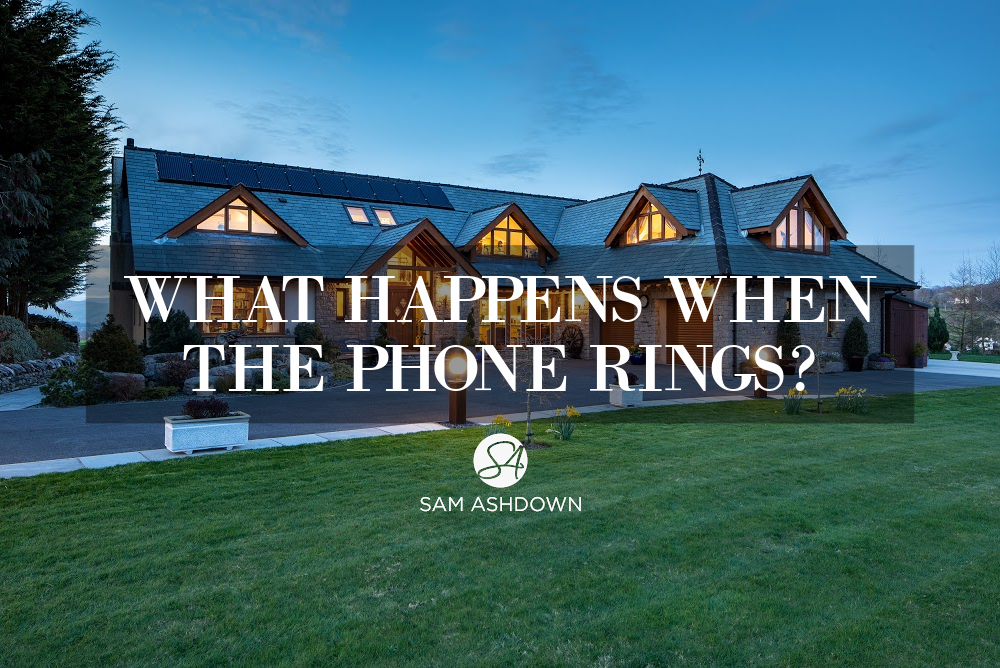You’re busy on a Very Important Task in your office, and the phone rings. More than once. You glance around, and see that everyone free is already on the phone, so you pick it up, a little reluctantly and answer probably a little more abruptly than you should do. Of course, no one in your team is sitting by the phone, just waiting for it to ring. Every person who answers the phone is being interrupted from what they were doing before the phone rang.
The challenge to an agency owner is this: the caller could be anyone; a tenant telling you a fuse has gone, or a homeowner with a million-pound property to sell. That first response from your office could earn – or cost – you thousands of pounds. So how do you make sure that, no matter who answers the phone, your company makes the caller feel important, valued and listened-to?
Are you motivating the right actions?
I used to work with a client with a single branch agency in the Midlands, who incentivised her staff to get off the phone as quickly as possible. Her rationale was that it was more efficient to get their contact details and action their request in the shortest possible time, so that her team members could go back to doing the Very Important Task that they were previously doing, before the phone rang.
How you rate your call handling depends on the objective you have for those in your team who answer the phone. If it’s to take information and then complete a task, then my Midlands client is encouraging the metrics that matter for her agency.
Our prime motivation in AshdownJones is to create a relationship by building trust. And we know that we can’t do that by shortening a call. If someone has taken the time and effort to find our phone number, and call our office, the last thing we want them to feel is that they are interrupting the person answering the phone. In fact, so important do we think this is in our agency, that we play a game of ‘how long can we keep a new caller on the phone?’
Not against their will, of course…. We just think it’s important to give that person the time and space to talk freely, and discuss any topic that is on their mind. Rebecca, our wonderful designer, once chatted to someone for 43 minutes, and currently holds the team record, (a record I’m keen to see broken.) The caller was a lad, asking about a home we had for sale, and was interested to know from Rebecca where she should buy, given her criteria. Rebecca made her feel special, important, and listened to. All the things we really want a caller to feel when they phone our office.
Let’s face it – our offices are not the busy hubs they were a decade ago; not for sales, anyway. In years gone by, you wouldn’t be able to hear yourselves think in an agency office for the phone ringing constantly; these days, when so much is done online, our phones simply ring much less often.
All the more reason to cherish every single caller, and use each very valuable opportunity to create a relationship, on their terms.
Incidentally, the lady caller Rebecca chatted to for 43 minutes, went on to buy one of our lovely homes, making us, our client, and her, very happy.
How we train our team to be brilliant call-takers
When we first started building our team at AshdownJones, I took on the responsibility of training the team to answer the phone the ‘AJ way’.
Having done countless hours of telephone training in my early days as an industry trainer, it took me a while to accept my training wasn’t working as well as I had hoped. The principles and strategies I taught were not long-lasting, and old habits were seemingly too easy to drop back into.
It took me a while to discover the answer to this problem but when I did, it was like a light-bulb going on. I realised that there were two elements that needed to change:
1. Frequency – there’s no way that one training session will change a lifetime of habits. Training needs to be frequent, preferably weekly.
2. Self-awareness – the team were not aware of how they were coming across to a caller on the phone. They were slightly frustrated, having just been interrupted by a caller in whatever task they were working on, and in denial about the subsequent abruptness of their manner. To change their mindset, and make them more self-aware, I couldn’t ‘teach’ them to do it differently.
Firstly, I decided to tackle the ‘frequency’ challenge by integrating the training sessions into our weekly meetings. In this way, the learning would be retained, and built upon each week.
For the ‘self-awareness’ issue, we needed a completely different strategy from a ‘telling’ approach. I decided to trial something I’d been doing for years, for an entirely different reason.
For years, I ran HomeTruths – a consultancy for homeowners trying to sell their premium homes more effectively. As part of my diagnosis as to why the house wasn’t selling, my team and I would conduct a ‘mystery shop’ call to their current estate agent. We would rate them on several different factors, from the basic (did they offer their name?) to the more advanced (did they freely offer positive details about the house?). I estimate we’ve probably conducted around 3,000 of these mystery shops over the last decade and a half, so we’re heard the very worst – and the very best – responses.
Why not get our team to do a mystery shop call on speakerphone in front of the team, to a non-competitive agent, and then critique their response?
So we trialled it, and it was an instant success. Our process is simple; one of the team calls an estate agent, anywhere in the country, and asks them about a property they have listed. Our team members find it far easier to see the holes in someone else’s phone manner, style and content, and as a result, they have become far more self-aware, allowing them to tweak and refine their own responses. By putting themselves in a caller’s shoes, it enables them to really feel what a caller feels, and that’s so valuable when they themselves come to answer the phone. This method of team training has also helped to uncover very subtle differences in a response that can make someone feel positive or negative towards the agent, so we can really polish and perfect that opportunity of cultivating the best possible relationship with our caller, whether buyer or seller. We want to build trust, so that caller feels able to take the next step with us, whatever that step may be for them.
My challenge to you
If you’re not already running phone training sessions with your team, start them straight away. By implementing phone training, you’re demonstrating a clear message that how your team answers the phone is of the highest importance.
Once you have a regular training schedule set up, and you’ve explained to your team why the way calls are answered in your office is so important, try our ‘mystery shop’ approach. It’s simple but so effective, and you should start seeing the positive effects straight away, as each team member pays more attention to every caller.
A personal request from me: please don’t mystery shop us at AshdownJones. We get so many of these calls from other estate agents, that it costs us dearly in time and money. Choose another agent who doesn’t invest heavily in bespoke brochures! Thank you J
How do we rate a mystery shop?
We keep it simple, as you can see from this checklist you can use for your own training:
- Gave their name
- Took contact details including phone and email
- Asked questions about their requirements
- Made comments about the house
- Mentioned/suggested a viewing
- Seemed interested
- Asked permission to follow up
As well as this simple checklist, we also give negative points for using the following words:
- No problem
- No worries
- Bear with me
- Property (instead of house or home)
If we can hear them typing onto a CRM we see this as a negative too, as it tends to force questions that feel like a ‘tick box list’, as opposed to genuinely listening to the caller, and caring about their answers.
The proof is in the pudding
When you put more focus on, and effort into, answering the phone at your agency with a true motivation to understand and help, your business will grow; it’s inevitable. And if business growth is what you aspire to – as we do – then your phone training has to be a priority. After all, the way your team answer the phone is your chance to prove that all those lovely core values and mission statement you have on your website, actually happen. It’s the proof of your promises.
Ready to make the changes needed in your agency?
If you’d like a chat with my team to find out more about how we work, just tell us a bit about your business using this link, and let’s talk: https://forms.gle/qdhi57wsaoWvYyoj7



